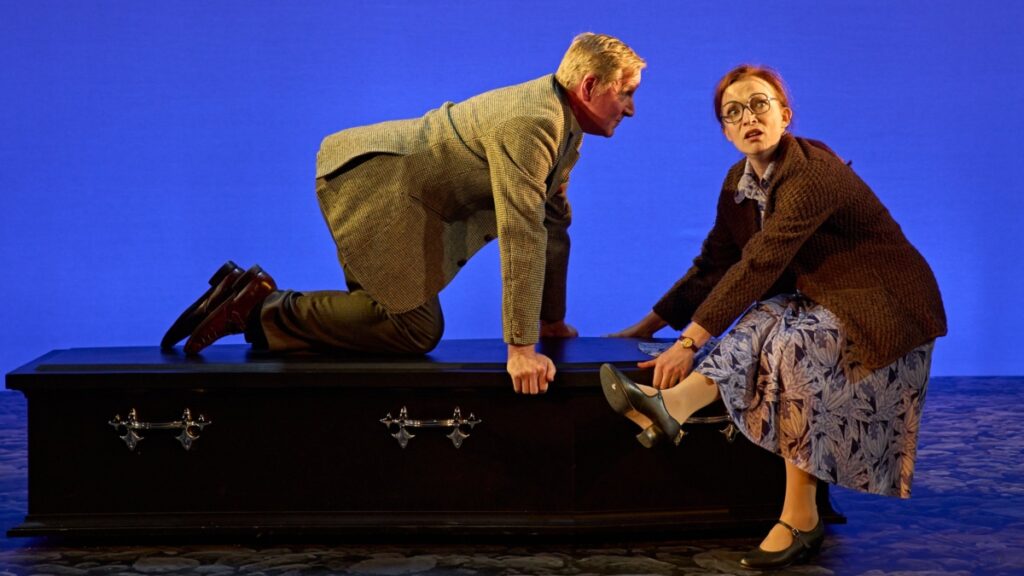Menier Chocolate Factory, London – until 27th February
Reviewed by Alun Hood
4****
Sex and death: two of the primary motivators of human existence. Joe Orton understood this: his Loot and What The Butler Saw are loaded with them. He had been dead six years when Alan Bennett’s 1973 Habeas Corpus made it’s West End debut in a production starring Sir Alec Guinness, but there’s undeniably something Orton-esque in this farcical melange of lust, longing, humiliation, epigrammatic wit and occasionally breathtaking bad taste.
It seems dated now (something director Patrick Marber doesn’t try to cover up, with his use of 70s pop music, Vaudevillian clichés and Richard Hudson’s decidedly retro costumes) but the richness and subversive free form nature of the writing as it veers between verse, crudity and cruelty, then back again, mark it as a true original, and a forerunner of the Alternative Comedy that transformed the genre a decade later. The problematic yesteryear trope of an ageing GP desperate to get his end away with a nubile young patient has not worn well, nor is it funny in itself. What sets Habeas Corpus apart from, and lifts it above, the dodgy sitcoms and farces that it riffs upon, is the delightful rhythm and absurdity of Bennett’s language -still sparklingly fresh after all these years- and the dark undertow. Death is everywhere: in the doctor’s uncomfortable descriptions of decaying human flesh, in the frequent references to World War Two, in the running theme of a neglected patient constantly trying to commit suicide, and in the shiny black coffin that constitutes most of Hudson’s elegantly spare set (lit with painterly precision by Richard Howell).
The cast is brilliant, each of them cleverly negotiating the sometimes abrupt gear changes between saucy postcard-made-flesh comedy excesses and real humanity with a lot at stake. Jasper Britton is manically funny as the priapic Dr Wicksteed but is authentically chilling in the final moments where a lifetime of casual unkindness and sexual impropriety seems to be catching up with him, like a middle aged East Sussex Don Giovanni. Catherine Russell finds a sadness and desperation in his permanently disappointed wife that touchingly belies the shrill but often hilarious battle axe persona she initially presents.
Similarly, Kirsty Besterman gives a poignant account of his perpetually single sister, forever fending off the advances of Matthew Cottle’s riotously named cleric Canon Throbbing (“together we will be at the forefront of Anglican sexuality!”) in favour of Dan Starkey’s enjoyably vicious senior medical specialist. Cottle even does a spot-on Bennett impersonation at one point. I also really loved Thomas Josling as the Wicksteed’s sweatily inept, perennially hypochondriac son, and Katie Bernstein as Felicity Rumpers, the stunning young woman who might deign to fall in love with him, but only if he really does have the terminal illness he thinks he’s got.
Ria Jones is a gorgeous comic gem as the all-seeing char lady Mrs Swabb, the only character who isn’t carnally obsessed (“I leave sex to the experts”) and Caroline Langrishe is great fun as Felicity’s British Colonial Grande Dame of a mother, forever bemoaning the loss of her privileged earlier life in Addis Ababa.
While one couldn’t make a convincing case for this being one of Bennett’s better plays (there’s very much a sense of hurling everything at the wall and seeing what sticks), it’s too bracingly original and too clear-eyed in the way it depicts the twin grips lust and mortality have on individual’s lives, to be written off merely as a period piece. It’s often laugh-out-loud funny and Marber’s fine production and terrific cast polish it up to an irresistible comic sheen. It’s naughty and not always nice: I think Joe Orton would have approved.

